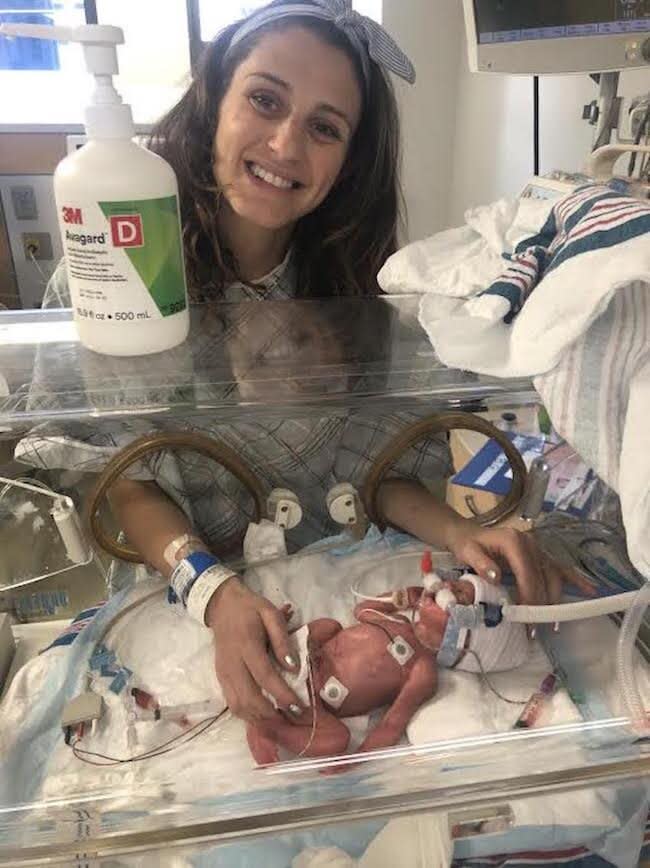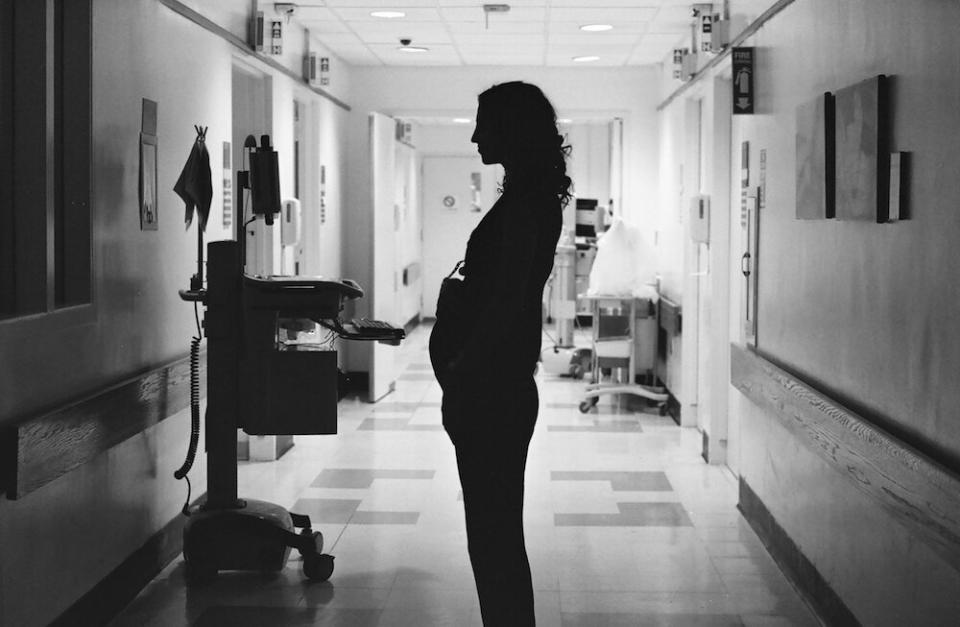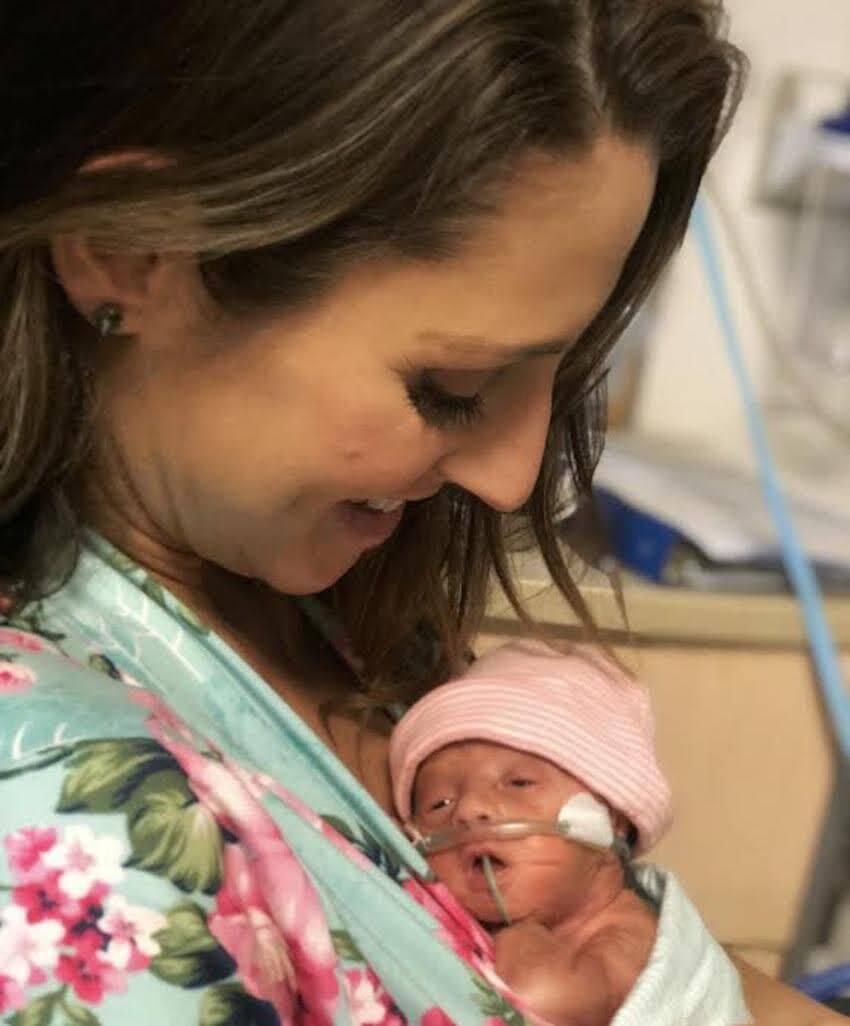What Being a NICU Mom is Really Like

Diana Perez | dianakperez.net
"You have a fever of 105!" the doctor exclaimed. I was sicker than I realized. And yet, all I could think about was seeing my newborn baby, who was born two and a half months before her due date. That was my first taste of motherhood, that moment I realized I wasn't thinking only about myself anymore.
Almost two weeks earlier, I had gone to the hospital with what I thought was a backache. The pain turned out to be early contractions—I was 27.5 weeks. Doctors worried I had placental abruption, a rare but serious complication where the placenta detaches from the uterus. I was put on hospital bed rest and waited to see if I would stop bleeding and contracting, or if my little girl would have to be delivered.
They were some of the longest days of my life, essentially going into labor every night and fighting through each day to keep my baby inside me. But I tried to focus on the positives and block out the negatives. Every day, I was greeted by nurses who checked on me almost every two hours. I made friends, I had things from Amazon and Seamless delivered to my room, and I even participated in crafts. I also made daily walks down my one corridor, gripping onto my IV pole, to see the new babies, all the while knowing my little girl would not make it to full term.
My thoughtful younger sister even surprised me with an impromptu pregnancy shoot in the hospital, dragging a light reflector, a bag of wardrobe changes, a photographer, and even my dog in tow, to capture my pregnancy. She knew I would likely not be able to go home until after delivery.

Diana Perez | dianakperez.net
After 10 days, a myriad of drugs, IV drips, magnesium, and steroids, the fight came to an end and my little girl decided enough was enough—as did my body. Within a day, I dilated past the point of no return, and at 6:10 a.m. delivered my 2.9-pound baby. The doctor said my placenta had completely fallen apart inside me.
I remember when my daughter came out, she cried and was breathing on her own, which was an incredible relief. But all I had was a quick glance; I didn't get to hold her. She was quickly whisked off to the neonatal intensive care unit (NICU), and I was left to process everything for the first time.
The NICU became my everyday reality for six weeks. It felt almost like I was working as a nurse even though that wasn't my job. It was odd, surreal, and completely out of my control. But I was not alone. Each day, I watched mothers walk in dazed, confused, crying, laughing, smiling, or sleeping slumped in a chair, as their babies sat in little boxes.
A strange part about having a NICU baby is how people react. The corridors of the postpartum area are usually filled with visiting families, balloons, and baby giggles, but when I arrived, that wasn't quite the case. No one really knew what to do, bring, or even if they should be happy for me or feel bad.

Provided by Stephanie Elliot
But I was happy and relieved my baby and I were now safer than before. My husband bought me a balloon and a bottle of champagne, my sister and mother followed suit, and that was enough for me. We did have a baby after all.
In the weeks that followed, I pumped breast milk every three hours throughout the day and night. I tried to visit my baby daily, fighting both epidural muscular pain, and a three-week viral infection, which caused me to have to visit her with a mask on and throw out my new breast milk.
Every day as a NICU mom, you wait to hear how the baby has done and very often you move two steps forward to only move two back. Particularly for mothers on the early side, like myself, it can be the longest weeks of your life. I'd had no chance to recover, and frankly, my mind was on the baby from day one.
Another strange part about all of this? The number of mothers out there who never talk about what they went through, especially those who have do it all again. My story was pretty grueling as my baby was pretty early. But there are worse stories than mine. There are mothers who lived in antenatal care for three months before delivery; there are mothers who gave birth to babies well under 25 weeks and slaved away each day to visit their sick baby in the NICU while having full-time jobs; and there are mothers who went through it all and sadly never even had the chance to take their baby home.
We need to take care of ourselves, and share our experiences, the bad and the good. We shouldn't hide them because they show the most important quality we may end up giving our children: strength.

Kristina Fearon | kristinafearonphotography.com
My daughter is now 39 weeks adjusted and weighs 6.4 pounds. She is home. She has spunk, she has attitude, and she is one little diva. Our past is not forgotten, nor the risk of future issues creeping up, but I am grateful. And so is my husband, who is even running the 2019 TCS New York City Marathon for the March of Dimes preemies.
Sometimes I look at other pregnant women who are plump and round and complaining and I envy them. I envy that they will be able to take their healthy baby home in about 24 hours or so after giving birth. And yet, I wouldn't trade my daughter for anything. She was small and early, but she is the biggest warrior I know. As a NICU mother, I look at my little girl and am reminded how tough women can be—right from the very start.

